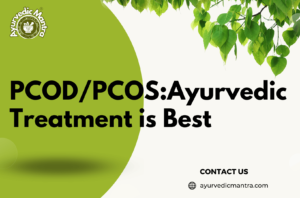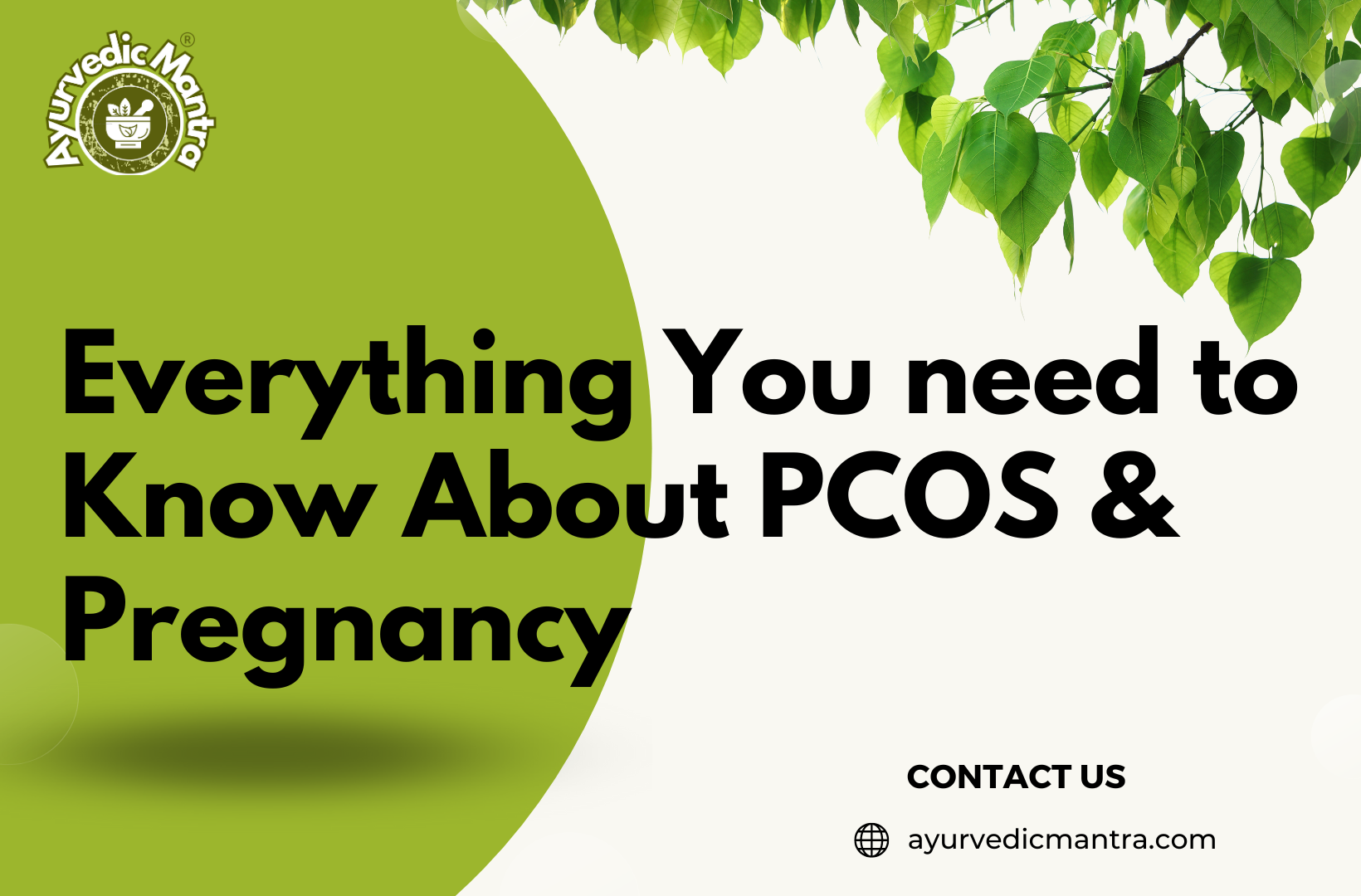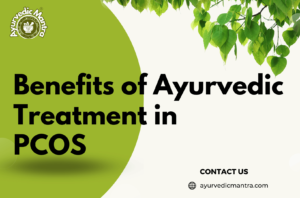
PCOD/PCOS: Ayurvedic Treatment is Best
Introduction Polycystic Ovary Disorder (PCOD) or Polycystic Ovary Syndrome (PCOS) is a common endocrine disorder affecting millions of women worldwide. It leads to hormonal imbalances,

If you or someone you know is dealing with Polycystic Ovary Syndrome (PCOS) and considering pregnancy, you’re not alone. PCOS is a common hormonal disorder that affects reproductive-age individuals and can impact fertility and pregnancy. This comprehensive guide’ll delve into the relationship between PCOS and pregnancy, offering insights, tips, and guidance for those navigating this journey.
PCOS, often called the “silent disorder,” involves an imbalance of reproductive hormones. Its hallmark traits include irregular periods, excess androgen levels, and polycystic ovaries. These cysts aren’t harmful but can lead to hormone imbalances that affect ovulation. While PCOS is a lifelong condition, its symptoms can be managed effectively, especially when planning for pregnancy.
One of the most pressing concerns for individuals with PCOS is how it affects fertility. Irregular or absent ovulation can make it challenging to conceive naturally. However, the situation is far from hopeless. Advances in medical science have provided numerous options for enhancing fertility. Lifestyle changes, such as maintaining a healthy weight, exercising regularly, and managing stress, can significantly improve your chances of conception.
Before embarking on your pregnancy journey, it’s crucial to consult a healthcare professional. A reproductive endocrinologist or gynecologist can help develop a personalized plan tailored to your needs. They might recommend ovulation-inducing medications like Clomiphene or Letrozole to stimulate egg release. Additionally, managing insulin resistance through medications like Metformin can contribute to successful conception.
Once you’re pregnant, managing your PCOS becomes even more important. Regular prenatal check-ups are essential to monitor your health and the baby’s development. Your healthcare provider will closely monitor factors like gestational diabetes, high blood pressure, and preterm labor – conditions that individuals with PCOS might be more prone to.
Maintaining a healthy lifestyle during pregnancy is paramount, especially for PCOS patients. A balanced diet of whole grains, lean protein, fruits, and vegetables can help regulate blood sugar levels. Staying active with exercises like swimming, walking, or prenatal yoga promotes physical well-being and reduces stress.
Self-care plays a significant role in managing PCOS and enjoying a healthy pregnancy. Getting enough sleep, practicing relaxation techniques, and connecting with supportive friends and family members can alleviate stress and positively impact hormonal balance. Remember, you’re not alone in this journey; seeking emotional support is a sign of strength.
In conclusion, navigating pregnancy with PCOS requires a proactive and informed approach. While PCOS can present certain challenges, countless individuals have successfully conceived and delivered healthy babies by managing their condition effectively. By understanding the intricacies of PCOS, seeking professional guidance, and adopting a holistic approach to health, you can optimize your chances of a successful and fulfilling pregnancy journey. Every individual’s experience is unique, so stay patient, positive, and empowered.
Polycystic Ovary Syndrome (PCOS) is a hormonal disorder characterized by irregular periods, excess androgens, and polycystic ovaries. It can affect pregnancy by disrupting ovulation, making it more challenging to conceive. Hormonal imbalances associated with PCOS might also increase the risk of gestational diabetes, high blood pressure, and preterm labor during pregnancy.
Yes, it is possible to get pregnant if you have PCOS. However, individuals with PCOS might experience irregular or absent ovulation, making conception more difficult. Consulting a healthcare professional and exploring fertility-enhancing treatments like ovulation-inducing medications can improve your chances of becoming pregnant.
Maintaining a healthy lifestyle is crucial for enhancing fertility with PCOS. This includes managing weight, eating a balanced diet, exercising regularly, and effectively managing stress. A doctor can also prescribe medications like Clomiphene and Letrozole to stimulate ovulation and increase your chances of conception.
Before attempting pregnancy, it’s essential to consult a healthcare provider specializing in reproductive health. They can create a personalized plan involving ovulation-inducing medications, managing insulin resistance with Metformin, and closely monitoring your health throughout the pregnancy.
Pregnancy with PCOS carries an increased risk of gestational diabetes, high blood pressure, and preterm labor. These risks stem from hormonal imbalances and metabolic issues often seen in individuals with PCOS. Regular prenatal care and monitoring can help mitigate these risks and ensure a healthy pregnancy.
Managing PCOS symptoms during pregnancy involves:
Staying active, eating a balanced diet, and practicing stress-reduction techniques can improve symptom management.
While PCOS itself doesn’t directly affect your baby’s health, certain complications associated with PCOS, such as gestational diabetes and high blood pressure, can impact both maternal and fetal health. Close monitoring and adherence to medical recommendations can help prevent or manage these complications.
A balanced diet is crucial during pregnancy with PCOS. Focus on whole grains, lean proteins, fruits, vegetables, and healthy fats. This can help regulate blood sugar levels and support overall health. Consulting a registered dietitian who specializes in PCOS can provide personalized dietary recommendations.
Ensuring a healthy and successful pregnancy journey with PCOS involves many factors. These include seeking expert medical guidance, following a healthy lifestyle, managing stress, attending regular prenatal appointments, and staying informed about your condition and its potential impact on pregnancy.
Various resources and support networks are available for individuals with PCOS planning a pregnancy. Online forums, support groups, and reputable healthcare organizations can provide valuable information, emotional support, and a sense of community for those navigating the unique challenges of PCOS and pregnancy.

Introduction Polycystic Ovary Disorder (PCOD) or Polycystic Ovary Syndrome (PCOS) is a common endocrine disorder affecting millions of women worldwide. It leads to hormonal imbalances,

Introduction Losing weight is a journey that requires dedication, consistency, and self-care. While there are numerous weight loss techniques out there, not all of them

Polycystic Ovary Syndrome (PCOS) is a hormonal disorder that affects millions of women worldwide. It can lead to various health complications, such as irregular periods,

In recent years, Ayurveda, an ancient system of natural healing originating from India, has gained significant popularity as an alternative approach to treating various health

आजकल वजन बढ़ने और चर्बी की वृद्धि होने की समस्या एक आम समस्या बन गई है। बढ़ते वजन और अतिरिक्त चर्बी के कारण न केवल

प्रस्तावना: आजकल वजन बढ़ने और ओबेसिटी की समस्या एक आम समस्या बन गई है। बढ़ते वजन के कारण न केवल शारीरिक समस्याएं होती हैं, बल्कि
